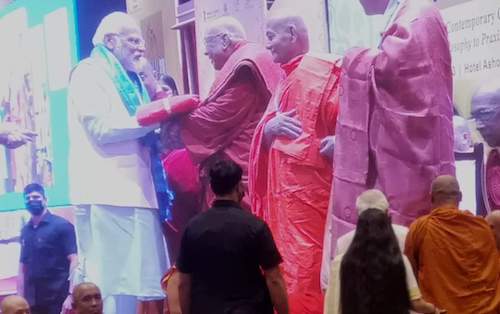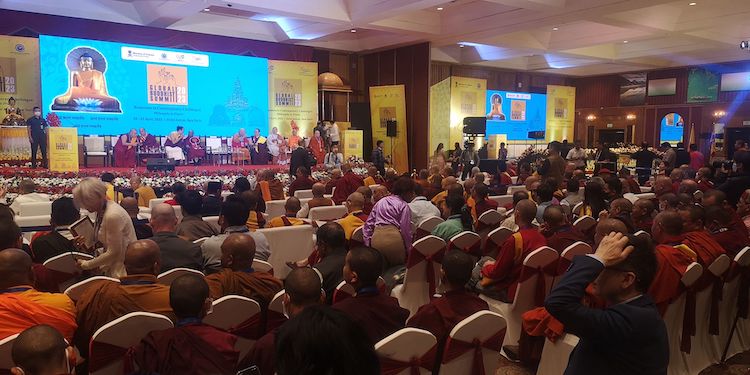Viewpoint by Lim Kooi Fong*
This Lotus News Feature, produced in association with the Buddhist Channel, is the 53rd in a series of joint productions with IDN-InDepthNews, the flagship agency of the Non-profit International Press Syndicate. Click here for previous reports.
NEW DELHI, 26 April 2023 (IDN | Buddhist Channel) — The recently concluded Global Buddhist Summit (GBS) held in New Delhi from 20-21 April was probably one of the biggest in terms of high-profile attendance. GBS was organised by the Delhi-based International Buddhist Confederation (IBC) with the support of the government of India.
In addition to His Holiness, the 14th Dalai Lama, Tai Situpa Rinpoche and prominent meditation teachers such as Mingyur Rinpoche, the Supreme Patriarch of Vietnam Thich Tri Quang, Ven. Sitagu Sayadaw of Myanmar, Pomnyun Sunim of South Korea, Supreme Head of Mongolian Buddhists Khamba Lama Choijamts, Jetsunma Tenzin Palmo and famous Tibetologist Prof Robert Thurman, were the luminaries, together with almost 500 participants in attendance. Out of these, close to 180 were foreign dignitaries.
The scale and breadth of such illuminating Buddhist leaders all gathered in one place was something no other global conferences have pulled off recently. Even the Bangkok-based World Fellowship of Buddhists (WFB), the so-called de facto international umbrella of all Buddhist organizations, is seen to be falling way short of having the pull factor. None have the energy and zest that the GBS exuded.
This raised a pertinent question: Is the GBS the dawn of a truly global meeting place where the best Buddhist minds can gather, discuss and forge meaningful resolutions? The key here is meaningful and effective aspirations rather than proclaiming a list of things to do that are forgotten once the conference ends. So, what did India do that got things so right?
Whether by choice of design or just good random planning that got things falling into place, the success of the GBS boils down to some crucial factors.
IBS, Truly Global
The word “global” in many so-called Buddhist conferences is sadly just a misnomer. Getting two or three famous names to be keynote presenters and inviting many countries to attend may signify its international feel, but as an impact generator, it always ends in a whimper. “Global” means it must have that outreach clout, where participants feel that they have a role in making an impact.
Aside from the big names gracing the GBS, a hidden statistic bear some exciting analysis. The biggest country delegation to the event, apart from the host, was Vietnam, with 30 delegates. While Vietnam has a sizeable Buddhist population, its influence goes way beyond its shores in the form of its exiled teacher, the late Ven. Thich Nhat Hahn.
The Buddhism of Thich Nhat Hahn reaches all parts of the globe, with the West being its most ardent adherents. When such a delegation participates in a conference, its followers tend to be interested in the proceedings. The interest is international. The same goes for famous Tibetan teachers, such as HH and the Dalai Lama. Their voices reverberate far beyond the walls where they emanate.
The clout of the host
Global Buddhism never had a united voice. Even when issues occur that threaten the interest of Buddhists, a consensus is rarely obtained to face them with a common front. An example would be the destruction of the Bamiyan Buddhas in 2001 by the Taliban. The whimpering protests from Buddhist governments pale with the direct rebuke from Muslim countries such as Saudi Arabia and Pakistan. Buddhists did not protest as a collective voice.
Why so? Because generally speaking, countries with a Buddhist majority are considered small. But what if an up-and-coming superpower like India would now take the mantle and offer leadership to champion Buddhist issues, would that make a difference? Of course, with power comes responsibility. But with power coming from a superpower, no one can ignore the roar.
Some may wonder why leave the fate of Buddhists in Hindu hands, like what has happened to the management trust of the Mahabodhi temple at Bodhgaya? Should India wish to play the lead role, will other Buddhist majority countries support it, since the alternative is status quo and offer no meaningful impact?
While some may have reservations about India’s move to consolidate its “soft power” by using the Buddhist faith, Buddhism as a whole may benefit from a more consolidated approach. With better financing, more interest in scientific-based research to understand Buddhist philosophy, the adoption of consensus building and more precise policy formulations to face existing challenges using Buddhist teachings, this could be a game changer and one that is overdue.
IBC and the Scientific Approach
In one of the discussion topics, the GBS focused on the environmental crisis, health and sustainability. Attending this particular forum was an eye-opening experience because the content of the discussions was that of those involved in scientific research one gets to hear and see at biodiversity and environment meetings.
An example would be the presentation of Dr Sarah Kim Gruetzmacher, who delivered an excellent fact-based report on how irresponsible land use is decimating biodiversity, leading to the rise of zoonotic diseases which causes pandemics such as COVID-19 and bird flu. She not only outlined the issues and problems but also suggested steps to prevent future pandemics, all with sound scientific arguments and facts.
What’s refreshing was how she argued for using Buddhist compassion so that we learn to treat animals with respect and kindness. By doing so, “… we can drastically reduce the risk of future pandemics”.
The IBC, the organizer of the GBS, can undoubtedly upgrade the quality of its organization by ensuring that its advisory committee is not made up of just monks or nuns comfortable with Buddhist knowledge and traditions. Its management needs to be bold and draft a strategic approach which will have Buddhists engage in discussions with scientists.
This was alluded to by Prof Robert Thurman in his speech on the second day of the conference. As Buddhism requires one to examine and rigorously test its teachings, as embodied in the Kalama Sutta, there is no reason why the marriage of philosophy and scientific research cannot be done. If the IBC were to embark on this, India would be acknowledged as the driver that made Buddhism relevant in this time and age.
Land of the Buddha, Respecting Tradition
There is one thing no country can claim apart from India, and that is it was the land of the Buddha. With this association comes the link to religious institutions, from its texts (Tipitaka) to famous schools and traditions. One of these is the renowned Nalanda tradition, which was once a fount of creativity and scholarly excellence.
The Nalanda tradition is credited for the birth of Tibetan Buddhism, or Vajrayana, which has since given us brilliant Dharma masters such as Padmasambhava, Nagarjuna and Atisa. Today the Nalanda tradition can be seen to expand to mainly Christian Brazil through the dedication of Bro. Ricardo Sasaki.
India and the IBC, specifically, should play a more active role in ensuring that this tradition continues to thrive, both within and outside of India. It should be made as an export agenda. If the findings of Yi Jing can show that the Nalanda of old can exert influence as far as Korea and Sumatra in Indonesia, with today’s fast internet connection and efficient communication, there is no reason why this spirit of scholarship and research excellence cannot be replicated and revived.
Smart Associations, Clever Networks
Brains attract brains. Networks that are built with intelligence spawns are even more ground-breaking innovations. This has been the basis for the establishment of Silicon Valley in California. At the GBS, a forum was dedicated to pilgrimage and living heritage. Perhaps the IBC should consider expanding this to become a fixed point to develop Buddhist Tourism.
In 2020, the United Nations World Tourism Organization (UNWTO) published a landmark study on “Buddhist Tourism in Asia: Towards Sustainable Development”. There are some excellent suggestions listed there in the India chapter. IBC could play a role and push for developing a speciality network that includes tour operators, heritage administrators, airline companies and tourism consultants to leverage its rich Buddhist tradition.
An exciting development that happened by chance was the seeding of Buddhist news syndication. Since 2016, the IBC has invited non-South Asian-based independent Buddhist news agencies to cover its activities. Starting with SAMVAD, the Buddhist Channel (Malaysia), Lotus Communication Network and IDN (Australia), Buddhist Door (Hong Kong), and Buddhist Television Network (BTN) of Korea have become familiar names covering these events.
Through the mindful communication programme for journalism initiated by Lotus Communication Network, these outfits have established friendship and trust over the years. At this GBS, an effort was made for sharing news generated amongst themselves, thus establishing the basic framework of a dedicated Buddhist news syndicate.
What these two examples illustrate is that when the platform is allowed for freedom of association and creativity to thrive, new products and services are produced. This is the working of democracy at its best. IBC should encourage this, which reflects well on the image of India as the world’s largest functioning democracy.

< Prime Minister Modi presenting robes to foreign Buddhist monks. Photo Credit: Lim Kooi Fong
Where to now, GBS?
What happens after the GBS 2023 will very much depend on what the Government of India wants to do with it. In his speech at the conference, Prime Minister Narendra Modi showed his dedication and keenness in sharing India’s ongoing efforts towards preserving Buddhist heritage sites in the country and establishing centres of Buddhist learning and research.
He also emphasized the importance of promoting values such as compassion, non-violence, and peaceful co-existence, which are at the core of Buddhism, to address global challenges and create a better world for future generations.
The IBC is sure to play a more active role in regional Buddhist affairs, given the government’s support. Whether other Buddhist countries or their people embrace this new geo-political alignment is still up for debate. As the saying goes, the proof of the pudding is in the eating. Should the IBC play its role well and effectively and be seen as superior to what the current status quo offers, there is no reason why Buddhism will not be better off for it.
*Lim Kooi Fong is a Malaysian IT specialist and founder of The Buddhist Channel. [IDN-InDepthNews]
Photo: International Buddhist dignitaries taking their seats on the stage. Photo Credit: Lim Kooi Fong
Visit us on Facebook and Twitter.
IDN is the flagship agency of the Non-profit International Press Syndicate.
We believe in the free flow of information. Republish our articles for free, online or in print, under Creative Commons Attribution 4.0 International, except for republished articles with permission.

